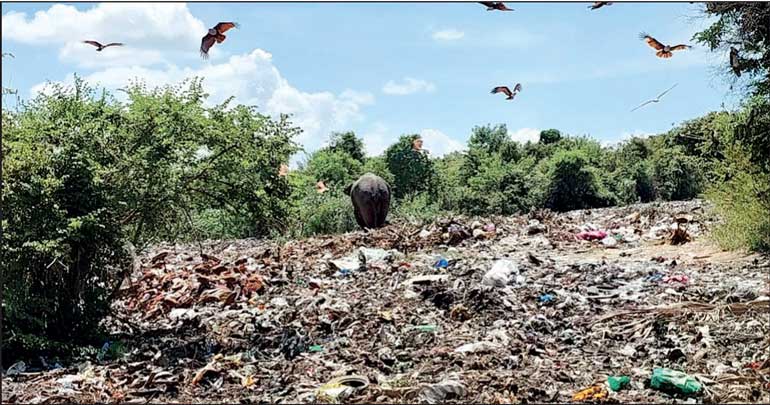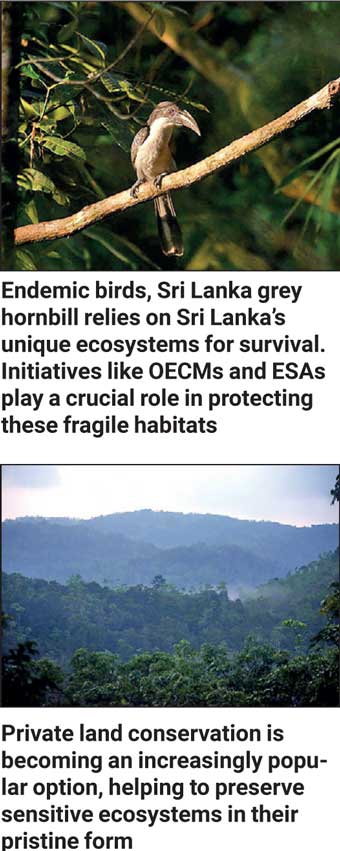Tuesday Feb 17, 2026
Tuesday Feb 17, 2026
Wednesday, 23 October 2024 00:00 - - {{hitsCtrl.values.hits}}

An elephant foraging at a garbage dump— a heartbreaking consequence of human negligence. This man-made disaster not only threatens wildlife but also highlights the urgent need for sustainable waste management and habitat protection – Pic by Chamal Jayasekara
 The latest Nations Trust WNPS Monthly Lecture will be held on 24 October at 6.00 p.m. at Jasmine Hall, BMICH.
The latest Nations Trust WNPS Monthly Lecture will be held on 24 October at 6.00 p.m. at Jasmine Hall, BMICH.
The event will see two experts Prof. Sandun Perera and Prof. Sevvandi Jayakody highlighting the meaningful area-based conservation and unravelling the jargon of OECMs and ESAs.
WNPS said Sri Lanka’s journey in declaring Protected Areas (PAs) is deeply rooted in history, dating back to the concept of “Abhaya Bhoomi,” where the sanctity of life was revered. From hunting grounds to vital catchments for irrigation projects, the objectives behind these PAs have evolved. But does the current network of PAs truly represent the incredible diversity of Sri Lanka’s ecosystems?
In the face of the triple planetary crisis — biodiversity loss, climate change, and pollution — the world is shifting towards evidence-based decision-making and inclusive models for conservation. This month’s lecture delves into the tools and strategies necessary for Sri Lanka to meet global conservation goals.
Thirty years after the Rio Convention on Biological Diversity (CBD), Sri Lanka, along with global partners, has embraced the Kunming-Montreal Global Biodiversity Framework. The ambitious Target 3 aims to conserve 30% of the world’s terrestrial, inland, coastal, and marine areas by 2030 through protected areas and Other Effective Area-Based Conservation Measures (OECMs).
Prof. Sandun Perera and Prof. Sevvandi Jayakody will take participants back to a pivotal moment since the COVID-19 pandemic when nearly 100 scientists in Sri Lanka worked with a novel approach and identified 139 Environmentally Sensitive Areas (ESAs) beyond the current PA network. Participants also will be able to discover how a three-tiered system of PAs, OECMs, and ESAs can lead Sri Lanka toward a meaningful and sustainable conservation strategy.
Prof. Sevvandi Jayakody holds a BSc. (Hons.) Degree in Zoology from the University of Kelaniya, a Postgraduate Diploma in Wildlife Management and Conservation from the Wildlife Institute of India, a PhD in Zoology from the University of Aberdeen. She has conducted post-doctoral research at the SCIRO, Australia, the James Hutton Institute, Scotland and at the IDRC, Canada. In 1997, she joined the Department of Wildlife Conservation as an Assistant Director and currently serves as a Senior Lecturer at the Wayamba University of Sri Lanka. Prof Sevvandi is a General Committee Member of the WNPS.
Prof. Sandun J. Perera is a leading expert in Biogeography and Environmental Conservation at Sabaragamuwa University, Sri Lanka, with over 30 years of field research experience across Sri Lanka and South Africa. His work spans biodiversity inventory, macroecology, and conservation biogeography. A prolific author of books and research papers, Sandun currently serves as the Programme Coordinator for the IUCN in Sri Lanka, attempting to reduce the gap between research, applications, and policy in environmental conservation.
The monthly lecture of the WNPS is supported by Nations Trust Bank is open free for members and non-members.
